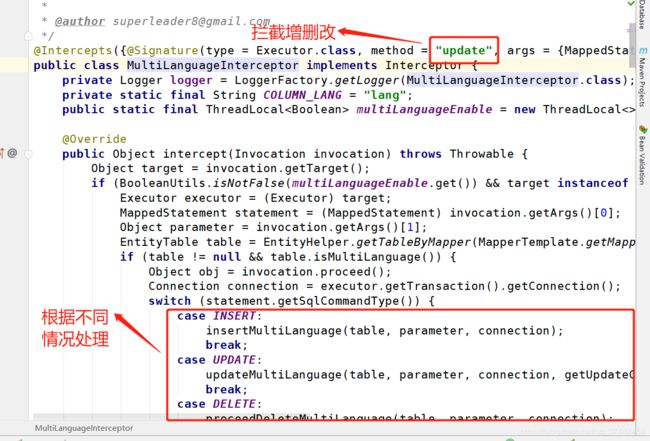HZERO多语言维护及源码解析
一、实现
1.多语言的保存
多语言Entity实体类
实体类上添加@MultiLanguage注解,多语言字段添加@MultiLanguageField注解标记
package org.wms.mdm.domain.entity;
import com.fasterxml.jackson.annotation.JsonInclude;
import io.choerodon.mybatis.annotation.ModifyAudit;
import io.choerodon.mybatis.annotation.MultiLanguage;
import io.choerodon.mybatis.annotation.MultiLanguageField;
import io.choerodon.mybatis.annotation.VersionAudit;
import io.swagger.annotations.ApiModel;
import io.swagger.annotations.ApiModelProperty;
import lombok.*;
import lombok.experimental.FieldNameConstants;
import org.hzero.export.annotation.ExcelColumn;
import org.hzero.export.annotation.ExcelSheet;
import org.wms.mdm.domain.render.CustomerFlagValueRenderer;
import org.wms.mdm.utils.dto.WmsDto;
import javax.persistence.Table;
import javax.persistence.Transient;
/*
* 客户信息
* @date 2019/12/20
* @author 潘顾昌
* @version 0.0.1
* @copyright Copyright (c) 2019, Hand
*/
@ToString
@Getter
@Setter
@NoArgsConstructor
@AllArgsConstructor
@Builder
@FieldNameConstants(prefix = "FIELD_")
@ApiModel("客户信息")
@VersionAudit
@ModifyAudit
@JsonInclude(value = JsonInclude.Include.NON_NULL)
@ExcelSheet(zh = "客户", en = "customer")
@Table(name = "wmdm_customer")
@MultiLanguage
public class Customer extends WmsDto {
public static final String FIELD_ID = "id";
//
// 业务方法(按public protected private顺序排列)
// ------------------------------------------------------------------------------
//
// 数据库字段
// ------------------------------------------------------------------------------
@MultiLanguageField
@ApiModelProperty(value = "客户名称")
private String customerName;
@MultiLanguageField
@ApiModelProperty(value = "客户全称")
@ExcelColumn(zh = "客户全称", en = "customerFullname")
private String customerFullname;
@MultiLanguageField
@ExcelColumn(zh = "客户简称", en = "customerSegment")
@ApiModelProperty(value = "客户简称")
private String customerSegment;
//
// 非数据库字段
// ------------------------------------------------------------------------------
@Transient
@ApiModelProperty(value = "客户id")
private Long customerId;
}
数据库设计
wmdm_customer_tl主要记录customer的多语言字段
注意:字段和原字段保持一致,例如wmdm_customer中的多语言字段为customer_name,则wmdm_customer_tl中也要有该字段,字段名必须也为customer_name
直接利用内置的insertSelective保存
@ApiOperation(value = "创建客户信息")
@Permission(level = ResourceLevel.ORGANIZATION)
@PostMapping
public ResponseEntity<Customer> create(
@ApiParam(value = "租户id", required = true) @PathVariable("organizationId") Long organizationId,
@RequestBody Customer customer) {
//validObject(customer);
customer.setTenantId(organizationId);
validObject(customer);
customerService.insertCustomer(organizationId,customer);
return Results.success(customer);
}
customerRepository.insertSelective(customer);
2.多语言的查询
使用平台通用Mapper语句,底层已经关联多语言表进行查询
注意:使用自定义Mapper查询,需要自定义关联多语言表进行查询
<!--查询供应商信息-->
<select id="queryVendorList" resultMap="BaseResultMap" parameterType="org.wms.mdm.domain.entity.Vendor" >
<bind name="lang" value="@io.choerodon.mybatis.helper.LanguageHelper@language()"/>
SELECT
hcu.country_name,
hr1.region_name province_name,
hr2.region_name city_name,
hr3.region_name district_name,
t.id,
t.id vendorId,
t.vendor_code,
t.vendor_name,
t.vendor_fullname,
t.vendor_status,
t.license,
t.contact,
t.mobile,
t.tel,
t.email,
t.fax,
t.zip_code,
t.country_id,
t.country,
t.province_id,
t.province,
t.city_id,
t.city,
t.district_id,
t.district,
t.address,
t.enabled_flag,
t.start_date,
t.end_date,
t.remark,
t.tenant_id,
t.object_version_number,
t.creation_date,
t.created_by,
t.last_updated_by,
t.last_update_date,
t.ATTRIBUTE_CATEGORY,
t.ATTRIBUTE1,
t.ATTRIBUTE2,
t.ATTRIBUTE3,
t.ATTRIBUTE4,
t.ATTRIBUTE5,
t.ATTRIBUTE6,
t.ATTRIBUTE7,
t.ATTRIBUTE8,
t.ATTRIBUTE9,
t.ATTRIBUTE10,
t.ATTRIBUTE11,
t.ATTRIBUTE12,
t.ATTRIBUTE13,
t.ATTRIBUTE14,
t.ATTRIBUTE15,
t.freight_forwarder_flag,
t.customs_broker_flag,
t.source_org_id,
t.source_id,
t.source_system_code
FROM
wmdm_vendor t
LEFT JOIN wmdm_vendor_tl tt ON t.id = tt.id AND tt.lang = #{lang}
LEFT JOIN hzero_platform.hpfm_country hcu ON hcu.country_id = t.COUNTRY_ID
LEFT JOIN hzero_platform.hpfm_region hr1 ON hr1.region_id = t.PROVINCE_ID
LEFT JOIN hzero_platform.hpfm_region hr2 ON hr2.region_id = t.CITY_ID
LEFT JOIN hzero_platform.hpfm_region hr3 ON hr3.region_id = t.DISTRICT_ID
WHERE t.tenant_id = #{tenantId}
<if test="id != null">
AND t.id = #{id}
</if>
<if test="vendorCode != null">
AND t.vendor_code LIKE '%${vendorCode}%'
</if>
<if test="vendorName != null">
AND t.vendor_name LIKE '%${vendorName}%'
</if>
</select>
二、原理
核心原理:采用Mybatis拦截器io.choerodon.mybatis.language.MultiLanguageInterceptor,对sql语句进行拦截,然后根据不同情况做出不同处理。
1.首先在io.choerodon.mybatis.MybatisMapperAutoConfiguration配置拦截器sqlSessionFactory.getConfiguration().addInterceptor(new MultiLanguageInterceptor());
/**
* 配置支持的数据库方言以及分页、排序插件
*
* @param dataSource dataSource
* @param sqlSessionFactory sqlSessionFactory
* @return Dialect
* @throws SQLException SQLException
*/
@Bean
public Dialect dialect(DataSource dataSource, SqlSessionFactory sqlSessionFactory) throws SQLException {
Dialect dialect = null;
Connection connection = dataSource.getConnection();
try {
String productName = connection.getMetaData().getDatabaseProductName();
if (DatabaseProductName.SQL_SERVER.value().equals(productName)) {
dialect = new SqlServerDialect();
} else if (DatabaseProductName.ORACLE.value().equals(productName)
|| DatabaseProductName.GAUSS.value().equals(productName)) {
dialect = new OracleDialect();
} else if (DatabaseProductName.MYSQL.value().equals(productName)
|| DatabaseProductName.HDB.value().equals(productName)) {
dialect = new MySqlDialect();
} else {
logger.warn("未知数据库类型,默认使用MySQL方言。");
dialect = new MySqlDialect();
}
DialectHelper.setDialect(dialect);
PageInterceptor pageInterceptor = new PageInterceptor(dialect);
pageInterceptor.setProperties(new Properties());
sqlSessionFactory.getConfiguration().addInterceptor(pageInterceptor);
sqlSessionFactory.getConfiguration().addInterceptor(new MultiLanguageInterceptor());
sqlSessionFactory.getConfiguration().addInterceptor(new SecurityTokenInterceptor());
sqlSessionFactory.getConfiguration().addInterceptor(new DataSecurityInterceptor());
sqlSessionFactory.getConfiguration().addInterceptor(new CrossSchemaInterceptor());
//配置JdbcTypeForNull, oracle数据库必须配置,解决插入null的时候报错问题
sqlSessionFactory.getConfiguration().setJdbcTypeForNull(JdbcType.NULL);
} catch (SQLException e) {
logger.info("[sql exception]" + e);
} finally {
connection.close();
}
return dialect;
}
2.当执行SQL语句时进行拦截操作

